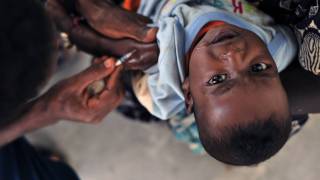Mandates Increased Vaccination Rates in Europe

A new study found mandatory vaccinations and the magnitude of fines were associated with higher vaccination coverage in 29 European countries in 2019.
Moreover, this study’s finding indicates mandatory vaccination was associated with lower measles incidence for countries with mandatory vaccination, without non-medical exemptions.
Published in the American Academy of Pediatrics on January 13, 2020, these researchers are believed to be the first peer-reviewed analysis of the association between mandates and both coverage and subsequent incidence of vaccine-preventable disease in Europe.
Using data from the European Centre for Disease Prevention and Control and the World Health Organization, they evaluated the relationship between country-level mandatory vaccination policies and (1) measles and pertussis vaccine coverage and (2) the annual incidence of these diseases in 29 European countries.
This study found mandatory vaccination was associated with a 3.71 percentage point higher prevalence of measles vaccination and a 2.14 percentage point higher prevalence of pertussis vaccination when compared with countries that did not have mandatory vaccination.
This study did not find a significant association between mandatory vaccination and pertussis incidence.
This study provides actionable insights to reduce the number and intensity of disease outbreaks in Europe related in part due to decreased vaccine coverage.
In Europe, mandatory vaccination policies vary not only in the presence or absence of a mandate but also in the implementation and enforcement of the mandates as well as in the consequences faced by individuals who fail to comply with their country’s policy.
Multiple countries in Europe, including France and Italy, have recently faced outbreaks of vaccine-preventable diseases, such as measles, and in response have changed their policies, whereas other countries are considering introducing immunization mandates.
Of the 29 European countries included in this study, 7 have mandated vaccinations. Among these countries, only the Czech Republic and Latvia offered processes to acquire a nonmedical vaccination exemption.
Previous financial penalties have been used in non-European countries, with some success.
As an example, in Australia, 6 months after the implementation of “No Jab No Pay” at the beginning of 2016, “fully immunized coverage” of children at 1 year of age and 5 years of age had both reached record highs.
However, individuals who objected to vaccination were approximately twice as likely to reside in areas of higher socioeconomic resources.
This means financial disincentives may not be adequate because those more likely to refuse vaccination may also have the ability to bear the consequences of the financial disincentives.
During 2018, the World Health Organization Regional Office for Europe recently released a Guide to Tailoring Immunization Programs, offering a process through which to identify obstacles and motivators to immunization in areas of low vaccination rates and for how to design interventions tailored to meet those factors.
In conclusion, these researchers said ‘although our findings support the use of mandatory vaccination and financial penalties to ensure the maintenance of the necessary high vaccination rates, our analysis involved existing mandates.’
‘The introduction of new mandates should be accompanied by careful surveillance of the impact on both vaccine acceptance and disease outcomes.’
This is because ‘vaccine mandates shift the balance of convenience in favor of vaccination and, when accompanied by robust vaccine safety assurance and vaccine communications programs, have the potential to play a substantial role in decreasing the negative impacts of vaccine-preventable diseases.’
Funding: No external funding. The authors have indicated they have no potential conflicts of interest to disclose.
International Vaccine news published by Vax-Before-Travel.
Our Trust Standards: Medical Advisory Committee
























